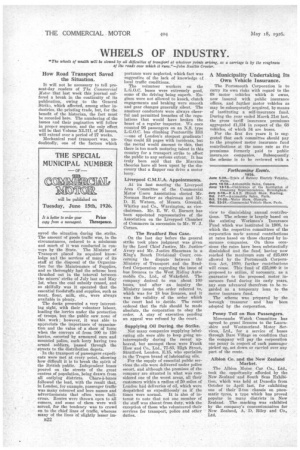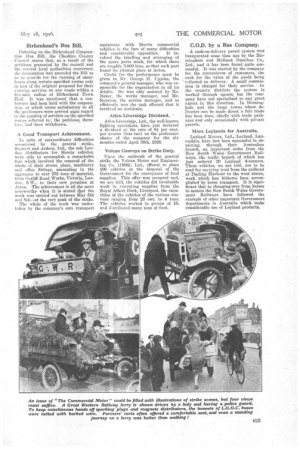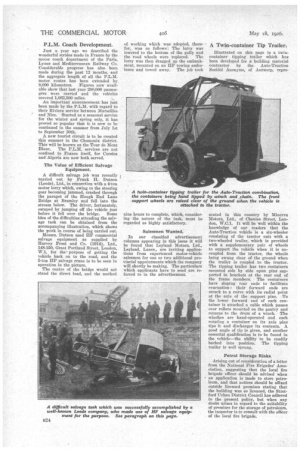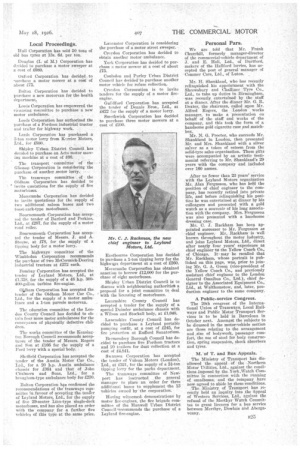WHEELS OF INDUSTRY.
Page 4

Page 5

Page 6

Page 7

If you've noticed an error in this article please click here to report it so we can fix it.
"The wheels of svealth will be slowed by all difficulties of transport at whatever points arising, as a carriage is by Me roughness of Me roads over which it runs."—John Beattie Crosier.
Flow Road Transport Saved the Situation.
It will not be necessary to tell present-day readers. of The Cosnntere-lal Motor that last week this journal suffered a break in the Continuity of its publication, owing to the General Strike, which affected, among other industries, the printing trade, but, for the benefit of the historian, the fact must be recorded here. The numbering of the issues and their pagination will follow in proper sequence, and the only effect will be that Volume XLIII, of 26 issues, will extend over a period of 27 weeks.
Mechanical road transport was, undoubtedly, one of the factors which saved the situation during the . strike. The amount of goods traffic was, in the circumstances, reduced to a minimum and much of it was conducted in convoys by the State. The Minister of Transport placed its acquired knowledge and the services of many of its staff at the disposal of the Organization for the Maintenance of Supplies, and so thoroughly had the scheme been thrashed out in the interval between. the miners' strike of July last and May 1st, when the coal subsidy ceased, and • so skilfully was it operated that the essential foodstuffs and supplies, such as meat, flour, milk, etc., were always available in plenty.
The docks presented a very interesting sight, with their volunteer labour, loading the lorries under the protection of troops, but the public saw none of this work ; however, it was able to appreciate the importance of organization and the value of a show of force when the convoys of from 100 to 150 lorries, escorted by armoured cars and mounted police, each lorry having two armed soldiers, passed through the Streets to the distribution depots.
In the transport of passengers expedients were met at every point, showing how difficult it is to break the spirit of the British public. Independent buses poured on the streets of the great centres of population, being drawn from all outlying districts. Chars-i-bancs followed the lead, with the result that, in London, for example, passenger traffic was many coloured and bore names and advertisements that often were ludicrous. Routes were thrown open to all corners, and some of them were well served, for the tendency was to crowd on to the chief lines of traffic, whereas many of the lines of slightly lesser im
portance were neglected, which fact was suggestive of the lack of knowledge t.f local traffic conditions.
The volunteer workers on the L.G.O.C. buses were extremely good, some of thc driving being superb. Engines were not allowed to knock, clutch engagements and braking were smooth and gear changes generally silent. The amateur conductors were always cheerful and permitted breaches of the regulations that would have broken the heart of a regular inspector. We once counted 96 passengers on an N.B. type L.G.O.C. bus climbing Pentonville Hill —one of London's steepest gradients! One could fill pages with incidents, but the recital would amount to this, that there is too much motoring talent in this country for a transport strike to affect the public to any serious extent. It has truly been said that the Marxian theories have all been upset by the discOvery that a flapper can drive a motor lorry.
Liverpool C.M.T.J.A. Appointments, At its last meeting the Liverpool Area Committee of the Commercial Motor Users Association elected Mr. Norman Barker as chairman and Mr. D. E. Watson, of Messrs. Greenall, Whitley and Co., Warrington, as vieechairman. Mr. R. W. G. Baruett has been appointed representative of the Association on the Liverpool Chamber of Commerce in succession to Mr. W. J. Comes.
The Bradford Bus Case:
On the last day before the general strike took place judgment was given by the Lord Chief Justice, Mr. Justice Avory and Mr. Justice Sheartnan in a King's Bench .Divisional Court concerning the dispute between the Ministry of Transport and the Bradford Corporation regarding the issue of bus licences to the West Riding Automobile Co., Ltd., of Wakefield. The company desired to run about 100 buses, and after an inquiry the Ministry issued the order referred to, which was for 18 bus licences, and it was the validity of the order which the court had to decide. The court ordered that the rule should he made absolute, the corporation to obey the order. A stay of execution pending an appeal was refused by the court.
Supplying Oil During the Strike.
Not many companies supplying, lubricating oils were able to keep going un interruptedly during the recent upheaval, but amongst these were Frank How and Co., Ltd., 77-83, High Street, Stratford. London. E.15, who specialize in the Trogon brand of lubricating oils.
For the supply of essential public services the oils were delivered under police escort, and although the premises of the company are situated in what was considered one of the worst areas, all their customers within a radius of 50 miles.of London had deliveries of oil, which were despatched as expeditiously as if the times were normal. It is also of interest to note that not one member of the staff was absent from duty, with the exception of those who volunteered their services for transport, police and other duties. A Municipality Undertaking Its Own Vehicle Insurance.
The Portsmouth Corporation is to carry its own risks with regard to the 68 motor vehicles which it owns, now insured with public insurance offices, and further motor vehicles as may be subsequently, acquired, by means of instituting a self-insurance fund. During the year ended March 31st last, the gross tariff insurance premiums aggregated £1,334 in respect of the 68 vehicles, of which 34 are buses.
For the first five years it is suggested that each committee should pay to the proposed motor insurance fund contributions at the same rate as the premiums formerly paid to public insurance companies. Subsequently the scheme is to be reviewed with a
view to diminishing annual contributions. The scheme is largely based on the existing Workmen's Insurance Fund which was instituted in 1908, to which the respective committees of the corporation made annual contributions at rates based on those charged by insurance companies. On three occasions the rates have been substantially diminished and the fund; having now reached the maximum sum of £25,009 allowed by the Portsmouth Corporation Act, 1920, further contributions will cease. This fund of £25,000 it is proposed to utilize, if necessary, as a guarantor to the proposed motor insurance fund during its early years, any sum advanced therefrom to be regarded as a temporary loan to the motor insurance fund.
The scheme was prepared by the borough treasurer and has been adopted by the corporation.
Penny Toll on Bus Passengers.
Morecambe Watch Committee has agreed to grant licences to the Lancashire and Westmorland Motor Services, Ltd., for a service of buses through Bare Village on condition that the company will pay the corporation one penny in respect of each passenger picked up, set down or carried over any part of the route.
Albion Co. and the New Zealand Market.
• The Albion Motor. Car. Co.' Ltd., took the oppottunity afforded by the New Zealand and South Seas Exhibition, which was held at Dunedin from October to April last, for exhibiting one of their 2-ton chassis on pneumatic tyres, a type which has proved popular in many districts in New Zealand. The machine was exhibited by the company's concessionnaires for New Zealand, A. D. Riley. and Co., Ltd.
Birkenhead's Bus Bill.
Debating an the Birkenhead Corporation Bus Bill, the Cheshire County Council states that, as a result of the petitions presented by the council and the several local authorities concerned, the corporation bad amended the Bill -so as to provide for the running of omnibuses along certain specified routes only in lieu of the original proposal for their runiiiir, services on any roads within a five-mile radius of Birkenhead Town Hall. It was mentioned that a conference liad been held with the corporation, at which terms satisfactory to all the petitioners were arrived atein regard to the running of services on the specified routes referred to • the petitions, therefore, had been withdrawn.
A Good Transport Achievement.
In spite of extraordinary difficulties occasioned by the general strike, Stewart and Ardern, Ltd., the sole London distributors for Morris vehicles, were able to accomplish a remarkable feat which involved the removal of the whole of their stores, plant, machilery and office fittings, amounting in the aggregate to over 275 tons of material,
from Road Works, Victoria, London, S.W., to their new premises. at Acton. The achievement is all the more noteworthy when it is stated that the work was carried out between May 5th and 8th—at the very peak of the strike.
The whole of the work was undertaken by the company's own transport
equipment with Morris commercial vehicles in the face of many difficulties
and considerable opposition. It involved the labelling and arranging of the spare parts stock, for which there are roughly 5,000 bins, so that each part found its allotted place at Acton.
Credit for the performance must be given to Mr. George H. Upjohn, the company's general manager, who was responsible for the organization in all its details. He was ably assisted by Mr. Baker, the works manager, and Mr. Royston, the service manager, and so efficiently was the task effected that it involved no accidents.
Allen-Liversidge Dividend. 5
Allen-Liversidge, Ltd., the well-known lighting specialists, have just declared a dividend at the rate of 6 per cent. per annum (less tax) on the preference shares of the company for the six months ended April 30th, 1926.
• Vulcan Convoys on Strike Duty.
Upon the outbreak of the general strike the Vulcan Motor and Engineering Co. (1906), Ltd., offered to place 100 vehicles at the disposal of the Government for the conveyance of food supplies. This offer was accepted and, we are told, the vehicles did invaluable work in conveying supplies from the Royal Albert Dock, Liverpool, the capacities of the vehicles of the various convoys ranging from 25 ewt. to 4 tons. The vehicles worked in groups of 10, and distributed many tons of food.
C.O.D. by a Bus Company.
A cash-on-delivery parcel system was inaugurated some time ago by the Birmingham and Midland Omnibus Co., Ltd., and it has been found quite successful. It was started by the company for the convenience of customers, the cash for the value of the goods being collected on delivery. A small commission is charged for their service. In the country districts the system is worked through agents, but the company have not specialized to any great extent in this direction. In Binningha'm and the large towns where deliveries can be made direct a fair trade has been done, chiefly with trade packages and only occasionally with private parcels.
More Leylands for Australia.
Leyland Motors, Ltd., Leyland, Lancashire, have just been successful in obtaining, through their Australian branch, an important order from the New South Wales Government Railways, the traffic branch of which has just ordered 20 Leyland 4-tonners. These vehicles, we are told, are to be used for carrying wool from the railhead at Darling Harbour to the wool stores, work which has hitherto been accomplished by horse transport. It is significant that in changing-over from horses to motors the New South Wales Government Railways have followed the example of other important Government departments in Australia which make considerable use of Leyland products.
P.L.M. Coach Development.
lust a year ago we described the wonderful strides made in France by the motor coach department of the Paris, Lyons and Mediterranean Railway Co. Considerable progress has also been made during the past 12 months, and the aggregate length of all the P.L.M. motor routes has been extended by
8,000 kilometres. Figures now available show that last year 200,000 passengers were carried and the vehicles covered 1,062,500 miles.
An important announcement has just been made by the P.L.M. with regard to their Riviera service between Marseilles
' and Nice. Started as a seasonal service for the winter and spring only, it has proved so popular that it is now to be continued in the summer from July 1st to September 30th.
A new tourist circuit is to be created this summer in the Chamonix district. This will be known as the Tour de Mont Blanc. The P.L.M. services are not confined to France itself, for Corsica and Algeria are now both served.
The Value of Efficient Salvage Equipment.
A difficult salvage job was recently carried out by Frank H. Dutson (Leeds), Ltd., in connection with a 4-ton motor lorry which, owing to the steering gear becoming jammed, crashed through the parapet of the Hough End Lane Bridge at Bramley and fell into the stream below. The driver, fortunately, escaped by jumping off the vehicle just before it fell over the bridge. Some idea of the difficulties attending the salvage task can be obtained from the accompanying illustration, which shows the !Fork in course of being carried out.
Messrs. Dutson used HF commercial salvage equipment as supplied •by Harvey Frost and Co. (1914), Ltd., 148-150, Great Portland Street, London, W.1, for the purpose of getting the vehicle back on to the road, and the 5-ton HF salvage crane is to be seen in operation in the picture.
The centre of the bridge would not stand the direct load, and the method
of working which was adopted, there• for, was as follows : The 'lorry was lowered to the bottom of the gully and the road wheels were replaced. The lorry was then dragged up the embankment, mounted on an HI' towing ambulance and towed away. The job took
nine hours to complete, which, considering the nature of the task, must be regarded as highly satisfactory.
Salesmen Wanted.
In our classified advertisement columns appearing in this issue it will be found that Leyland Motors, Ltd., Leyland, Lancs., are inviting applications from experienced motor-vehicle salesmen for one or two additional provincial appointments which the company will shortly be making. The particulars which applicants have to send are referred to in the advertisement.
A Twin-container Tip Trailer.
Illustrated on this page is a twincontainer tipping trailer which has been developed for a building material contractor by the Auto-Traction Societe Anonyme, of Antwerp, repre
sented in this country by Minerva Motors, Ltd., of Chenies Street, Loudon, W.C.1. It will be well within the knowledge of our readers that the Auto-Traction vehicle is a six-wheeler consisting of the tractor unit with a two-wheeled trailer, which is provided with a supplementary pair of wheels to support the vehicle when it is uncoupled from the tractor, the wheels being swung clear of the-ground when the trailer is coupled to the tractor. The tipping trailer has two containers mounted side by side upon pins supported in brackets at the rear end of the frame members. The containers have sloping rear ends to facilitate evacuation : their forward ends are struck to a curve with its radial point at the axis of the support pins. To the lower forward end of each container is attached a cable which passes over rollers mounted on the gantry and returns to the drum of a winch. The winches are hand-operated and each rotating a container on its axis pins tips it and discharges its contents. A good angle of tip is given, and another essential qualification is to be found in the vehicle—the ability to be readily backed into position. The tipping trailer is well sprung.
Petrol Storage Risks.
Arising out of consideration of a letter from the National Fire Brigades' Association, suggesting that the local fire brigade officer should be advised when an application is made to store petroleum, and that notices should be affixed outside licensed premises stating that the building was so licenced, the Stretford Urban District Council has adhered to the present policy, but when any doubt arises in regard to the suitability of premises for the storage of petroleum, the inspector is to consult with the officer of the local fire brigade.
Local Proceedings.
Hull Corporation has sold 50 tons of old bus tyres at 13s. 6d. per ton.
Douglas (I. of M.) Corporation has cided to purchase a motor sweeper at a cost of £980.
Oxford Corporation has decided to surehase a motor mower at a cast of about £75.
Bolton Corporation has decided to purchase a new motorvan for the health department .
Leeds Corporation has empowered the eieansiug committee to purchase a new motor ambulance. •
Leeds Corporation has authorized the Purchase of a Fordson industrial tractor. and trailer for highway work.
Leeds Corporation has purchased. a 3-too motor lorry from Ksrrier Motors, Ltd., for £580.. • Shipley Urban District Council has decided to purchase an Acto motor mowing machine at a cost of £66.
The transport 'committee of the GlOssop Corporation is considering the purchase .of another motor lorry, The tramways committee of the Oldham Corporation has decided to • invite quotations for the supply of five motorbuses.
Morecambe Corporation has decided to invite quotations for the supply of two additional saloon buses and two toast-rack-type motorbuses.
Bournemouth Corporation has accep-. Led the tender of Burford and Perkins, Ltd., at £287, for the supply of a motor road roller.
Bournemouth Corporation has accepted the tender of Messrs. J. and A. Steane, at £78, for the supply of a tipping body for a motor lorry.
The highways committee of the Wimbledon Corporation recommends the purchase of two McCormick-Deering industrial tractors at £272 each.
Bombay Corporation has accepted the tender of Leyland Motors, Ltd., at £1,338, for the supply of a 48 h.p. 300400-gallon turbine fire-engine.
Wham Corporation has accepted the tender of the Oldham Motor Car Co., Ltd., for the supply of a Motor ambulance and a 1-ton parcels motor-van.
The education committee of the London County-Couneil has decided to obtain four more motor ambulances for the conveyance of physically defective children.
The works committee of the Kensington Borough Council recommends acceptance of the tender of Messrs. Rogers and Son at £166 for the 'supply of a Ford lorry with a special body.
Sheffield Corporation has accepted the tender of the Austin Motor Car Co., Ltd., for a 20 i.p. Austin ambulance chassis for 1364 and that of John Chalmers and . Sons, Ltd., for a brougham-type ambulance body for £230.
Bolton Corporation 4s confirmed the recommendations of the tramways cammittee in.favour of accepting the tender of Leyland Motors, Ltd., for the supply of five 29-seater Lion-type single-deck motorbuses, and has also placed an order with the company for a funther five vehicles of this type at the same price. Lancaster Corporation is considering the purchase of a motor street sweeper.
Croydon Corporation has decided to obtain another motor ambulance.
York Corporation has decided to purchase a motor mower at a cost of about 175.
coulsdon and Purley Urban District Council has deeided-to purchase another motor vehicle for refuse collection.
Croydon Corporation is to invite tenders for the supply of a motor fireengine.
Guildford Corporation has accepted the tender of Dennis Bros., Ltd., at £422 for the supply of a motor lorry.
Smethwisk Corporation has decided to purchase three motor mowers at a cost of £200.
Eastbourne Corporation has decided to purchase a 1-ton tipping lorry for the highways department at a cost of £260.
Morecanabe Corporatton has obtained sanction to borrow £12,000 for the purchase of eight motorbuses.
Shipley -Urban District Council is to discuss with neighbouring authorities a proposal for a joint committee to deal with the licensing of motorbuses.
Lancashire County Council has accepted a tender for the supply of a special Daimler ambulance chassis with a Wilson and Stockall body, at £1,048.
Lancashire County Council has decided to purchase a Leyland portable pumping outfit, at a Cost of £245, for fire protection at Rufford Sanatorium.
Bermondsey Borough Council has decided to purchase five Fordson tractors and 20 trailers for dust collection at a cost of £4.841.
Swansea Corporation has accepted the tender of Vulcan Motors (London), Ltd., at £521, for the supply of a 2a-tort tipping lorry for the parks department.
The tramways . committee of Newport hag instructed. the general manager to place an order for three additional buses to supplement -the 13 vehicles owned by the corporation.
Having -witnessed. demonstrations by motor fire-engines, the fire brigade committee of the Hanwell Urban District Council .recommends the purchase of a Leyland fire-engine.
Personal Pars.
We are told that Mr. Frank Churchill, formerly manager-director of the commercial-vehicle department of J. and E. Hall, Ltd.' of Dartford, makers of the Hallford lorries, has accepted the post of general manager of -Commer Cars, Ltd., of Luton.
Mr. H. Shankland, who has recently relinquished his appointment with the Shrewsbury and Challiner Tyre Co., Ltd., to take up duties in Birmingham, was recently entertained by the staff at a dinner. -After the dinner Mr. G. R. Dexter, the chairman, called upon Mr. Alfred Rogers, the London works manager, to make a presentation on behalf of the staff and works of the company, and this took the form of a handsome gold cigarette case and matchbox.
Mr. N. G. Proctor, who succeeds Mr. Shankland in Lonclou, then presented Mr. and Mrs. Shankland with a silver salver as a token of esteem from the solid-tyre sales organization. These gifts were accompanied by an artistic testimonial referring to Mr. Shankland's 29 years with the company and included over 160 names.
After no fewer than 23 years' service with the Leyland Motors organization Mr. Alan Fergusson, who has held the position of chief engineer to the company, has recently retired into private life, and before relinquishing his position he was entertained at dinner by his colleagues and presented with a gold watch as a souvenir of his long association with the company. Mrs. Fergusson was also presented with a handsome dressing case.
Mr. C. J. Beckham has been appointed successor to Mr. Fergusion as -chief engineer.Mr. Beckham' is well known throughout the motor industry, and joins Leyland Motors, Ltd., direct after nearly four years' experience as chief engineer ta the Yellow Coach Co., of Chicago. It--may be recalled that Mr. Beckham, whose portrait is published on this page, was, prior to joining Mr. G. A. Green (vice-president of the Yellow Coach Co., and previously assistant chief engineer to the London General Omnibus Co., Ltd.), chief designer to the Associated Equipment Co., Ltd., at Walthamstow, and, later, production engineer to the same company.
A Public-service Congress.
The 20th congress of the International Union of Tramways, Local Railways and Public Motor Transport Services is to be held in Barcelona in October next. Amongst the subjects to be &cussed in the motor-vehicle section are those relating to the arrangement and size of bodywork, passenger comfort, the use of steel for body construction, spring suspension, shock absorbers and tyres.
M. of T. and Bus Appeals.
The Ministry of Transport has disallowed the appeal . of the Northern Motor Utilities, Ltd., against the conditions .imposed by the. York .Watch Committee in connection with the running of omnibuses, and the Company have now agreed to abide by these conditions.
• . The Ministry. of Transport has recently held an inquiry into the 'appeal of Western Services, Ltd., against the refusal of the Merthyr Watch Committee to grant licences for a bus service between Merthyr, Dosvlais and Aberga venny.


























